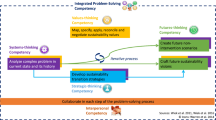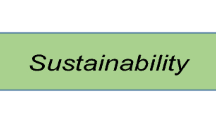Abstract
Monty Hempel was deeply engaged with the impact of sustainability education on student values and behavior. An important question that he posed was How can sustainability education provide a sound basis for the transformation of student learning? This question is highly relevant for the education of young adults—the students who pass through our classrooms—who will deal with the consequences of environmental crises such as climate change. Even though sustainability education is prevalent across college campuses, there is a disconnect between environmental concern and action. To examine this disconnect, we use a mixed methods approach to ask, What environmental issues concern young adults? What pro-environmental activities do they undertake? and What are the motivations and barriers for engaging in pro-environmental action? We led 93 undergraduate students from an introductory undergraduate environmental studies course to conduct 143 structured interviews about the environmental behaviors of their peers. While students cite large-scale systemic issues like climate change and the government-corporate nexus as key concerns, 97% of the reported behaviors in response to these issues were one-time, individualistic, incremental actions. Of the 143 interviewees, 59% reported taking only incremental actions. Less than 5% of students reported transformative actions toward systemic change, and only 3% reported transformative actions such as coordinated political mobilization. Students recognize the limitations of their incremental actions—they consider a lack of self-efficacy and community as barriers to transformative activities. Based on these findings and the reflections of students conducting interviews, we offer suggestions for designing educational interventions to empower young adults to engage in environmental action that matters.




Similar content being viewed by others
References
Abrahamse W, Steg L, Vlek C, Rothengatter T (2007) The effect of tailored information, goal setting, and tailored feedback on household energy use, energy-related behaviors, and behavioral antecedents. J Environ Psychol 27(4):265–276
Aitken C, Chapman R, McClure J (2011) Climate change, powerlessness and the commons dilemma: assessing New Zealanders’ preparedness to act. Glob Environ Chang 21(2):752–760
Anderson A (2012) Reflective journals as a tool for auto-ethnographic learning: a case study of student experiences with individualized sustainability. J Geogr High Educ 36(4):613–623. https://doi.org/10.1080/03098265.2012.692157
Atria F, Larraín G, Benavente JM, Couso J, Joignant A (2013) El otro modelo: Del orden neoliberal al régimen de lo público. Santiago de Chile: Debate. http://repositorio.uchile.cl/handle/2250/171790. Accessed June 2020
Axon S (2017) “Keeping the ball rolling”: addressing the enablers of, and barriers to, sustainable lifestyles. J Environ Psychol 52:11–25
Barr S, Gilg A (2006) Sustainable lifestyles: framing environmental action in and around the home. Geoforum 37(6):906–920
Bell BT, Toth N, Little L, Smith MA (2016) Planning to save the planet: using an online intervention based on implementation intentions to change adolescent self-reported energy-saving behavior. Environ Behav 48:1049–1072. https://doi.org/10.1177/0013916515583550
Benn S, Dunphy D (2009) Action research as an approach to integrating sustainability in MBA programs: an exploratory study. J Manag Educ 33(3):276–295
Besel RD, Burke K, Christos V (2017) A life history approach to perceptions of global climate change risk: young adults’ experiences about impacts, causes, and solutions. J Risk Res 20(1):61–75. https://doi.org/10.1080/13669877.2015.1017830
Bhattacharyya P, Chan CW, Waraczynski M (2018) How novice researchers see themselves grow. International Journal for the Scholarship of Teaching and Learning 12(2):3
Bhattacharyya P, Chan CW, Duchesne RR, Ghosh A, Girard SN, Ralston JJ (2020) Course-based research: a vehicle for broadening access to undergraduate research in the twenty-first century. Scholarsh Pract Undergrad Res 3(3):14–27
Bonney R, Phillips TB, Ballard HL, Enck JW (2016) Can citizen science enhance public understanding of science? Public Underst Sci 25(1):2–16
Campbell JL, Quincy C, Osserman J, Pedersen OK (2013) Coding in-depth semistructured interviews: problems of unitization and intercoder reliability and agreement. Sociol Methods Res 42(3):294–320
Capstick SB, Pidgeon NF (2014) What is climate change scepticism? Examination of the concept using a mixed methods study of the UK public. Glob Environ Chang 24:389–401
Chawla L, Cushing DF (2007) Education for strategic environmental behavior. Environ Educ Res 13(4):437–452. https://doi.org/10.1080/13504620701581539
Checkoway B (2011) What is youth participation? Child Youth Serv Rev 33(2):340–345. https://doi.org/10.1016/j.childyouth.2010.09.017
Coleman K, Danks C (2016) Service-learning: a tool to create social capital for collaborative natural resource management. J Environ Stud Sci 6:470–478. https://doi.org/10.1007/s13412-015-0239-7
Cook J (2016) Young adults’ hopes for the long-term future: from re-enchantment with technology to faith in humanity. J Youth Stud 19(4):517–532. https://doi.org/10.1080/13676261.2015.1083959
Corner A, Roberts O, Chiari S, Völler S, Mayrhuber ES, Mandl S, Monson K (2015) How do young people engage with climate change? The role of knowledge, values, message framing, and trusted communicators. Wiley Interdisciplin Rev Clim Change 6(5):523–534. https://doi.org/10.1002/wcc.353
Corral-Verdugo V, Mireles-Acosta JF, Tapia-Fonllem C, Fraijo-Sing B (2011) Happiness as correlate of sustainable behavior: a study of pro-ecological, frugal, equitable and altruistic actions that promote subjective wellbeing. Hum Ecol Rev 18(2):95–104
Dietz T, Rosa EA, York R (2007) Driving the human ecological footprint. Front Ecol Environ 5(1):13–18
Evans D (2011) Consuming conventions: sustainable consumption, ecological citizenship and the worlds of worth. J Rural Stud 27(2):109–115
Fildes J, Robbins A, Cave L, Perrens B, Wearring A (2014) Mission Australia’s 2014 youth survey report. Mission Australia, Sydney
Flanagan C, Levine P (2010) Civic engagement and the transition to adulthood. Future Child 20:159–179
Frisk E, Larson KL (2011) Educating for sustainability: competencies & practices for transformative action. J Sustain Educ 2(1):1–20
Gallagher MF, Cattelino J (2020) Youth, climate change and visions of the future in Miami. Local Environ 25(4):290–304. https://doi.org/10.1080/13549839.2020.1744116
Gardner GT, Stern PC (2002) Environmental problems and human behavior, 2nd edn. Pearson Custom Publishing, Boston
Gravning N (2020) https://www.ashoka.org/en-us/story/case-changemaker-education. Accessed Jan 2021
Guckian M, De Young R, Harbo S (2017) Beyond green consumerism: uncovering the motivations of green citizenship. Mich J Sustain 5(1):73–94
Harris A, Wyn J, Younes S (2010) Beyond apathetic or activist youth: ‘ordinary’ young people and contemporary forms of participation. Nord J Youth Res 18:9–32
Head L (2016) Hope and grief in the Anthropocene: reconceptualising human-nature relations. Routledge, London, UK
Hempel M (2008) Editorial: is sustainability sustainable? A View from Higher Education. https://doi.org/10.1089/SUS.2008.9983
Hempel M (2014) Ecoliteracy: knowledge is not enough. State of the World 2014. Island Press, Washington, DC, pp 41–52
Hopkinson P, James P (2010) Practical pedagogy for embedding ESD in science, technology, engineering and mathematics curricula. Int J Sustain High Educ 11(4):365–379
Inkpen R, Baily B (2020) Environmental beliefs and their role in environmental behaviours of undergraduate students. J Environ Stud Sci 10(1):57–67
Ithaca College (n.d.) https://www.ithaca.edu/sustainability-ithaca. Accessed Oct 2021
Kaiser FG, Fuhrer U (2003) Ecological behavior’s dependency on different forms of knowledge. Appl Psychol 52(4):598–613
Kent J (2009) Individualized responsibility and climate change: ‘if climate protection becomes everybody’s responsibility, does it end up being no-one’s? Cosmopolitan Civ Soc J 1(3):132–149
Krippendorff K (2004) Reliability in content analysis: some common misconceptions and recommendations. Hum Commun Res 30(3):411–433
Kollmuss A, Agyeman J (2002) Mind the gap: why do people act environmentally and what are the barriers to pro-environmental behavior? Environ Educ Res 8(3):239–260
Lidgren A, Hakan R, Huisingh D (2006) A systematic approach to incorporate sustainability into university courses and curricula. J Clean Prod 12(9/11):797–809
Machin A (2013) Negotiating climate change: radical democracy and the illusion of consensus. Zed Books, London
Maniates MF (2002) Individualization: plant a tree, buy a bike, save the world? In: Princen T, Maniates M, Conca K (eds) Confronting Consumption. MIT Press, Cambridge, pp 43–66
Mead E, Roser-Renouf C, Rimal RN, Flora JA, Maibach EW, Leiserowitz AA (2012) Information seeking about global climate change among adolescents: the role of risk perceptions, efficacy beliefs and parental influences. Atl J Commun 20:31–52. https://doi.org/10.1080/15456870.2012.637027
Norgaard KM (2011) Living in denial: climate change, Emotions, and Everyday Life. MIT Press, Cambridge
O'Brien K, Sygna L (2013) Responding to climate change: The three spheres of transformation. Proceedings of Transformation in a Changing Climate, 19–21 June 2013, Oslo, Norway. University of Oslo, pp 16–23. Accessed June 2020
Ojala M (2012) How do children cope with global climate change? Coping strategies, engagement, and well-being. J Environ Psychol 32:225–233
Ojala M (2012) Regulating worry, promoting hope: how do children, adolescents, and young adults cope with climate change? Int J Environ Sci Educ 7:537–561
Ojala M (2013) Coping with climate change among adolescents: implications for subjective well-being and environmental engagement. Sustainability 5:2191–2209. https://doi.org/10.3390/su5052191
O’Loughlin B, Gillespie M (2012) Dissenting citizenship? Young people and political participation in the media-security nexus. Parliam Aff 65(1):115–137
Ostrom E (1990) Governing the commons: the evolution of institutions for collective action. Cambridge University Press, New York
Partridge E (2008) From ambivalence to activism: young people’s environmental views and actions. Youth Stud Aust 27(2):18
Resnick, D, Casale D (2011) The political participation of Africa’s youth: turnout, partisanship, and protest. World Institute for Development of Economics Research (WIDER) Working Paper 2011/056. United Nations University–WIDER, Helsinki
Saldaña J (2021) The coding manual for qualitative researchers, 4th edn. Sage Publications, Los Angeles
Stern PC (2000) New environmental theories: toward a coherent theory of environmentally significant behavior. J Soc Issues 56(3):407–424
Stevenson KT, King TL, Selm KR, Peterson MN, Monroe MC (2018) Framing climate change communication to prompt individual and collective action among adolescents from agricultural communities. Environ Educ Res 24(3):365–377. https://doi.org/10.1080/13504622.2017.1318114
Stoll-Kleemann S, O’Riordan T, Jaeger CC (2001) The psychology of denial concerning climate mitigation measures: evidence from Swiss focus groups. Glob Environ Chang 11(2):107–117
Sweat Jeffrey, Jones Glenda, Han Suejung, Wolfgram Susan M (2013) How does high impact practice predict student engagement? A comparison of white and minority students. Intern J Scholarsh Teach Learn 7(2):17
Taft JK, Gordon HR (2013) Youth activists, youth councils, and constrained democracy. Educ Citizenship Soc Justice 8(1):87–100. https://doi.org/10.1177/1746197913475765
Taylor M, Watts J, Bartlett J (2019) Climate crisis: 6 million people join latest wave of global protests. https://www.theguardian.com/environment/2019/sep/27/climate-crisis-6-million-people-join-latest-wave-of-worldwide-protests. Accessed June 2020
Wapner P (2016) Contemplative environmental studies: pedagogy for self and planet. The Journal of Contemplative Inquiry 3(1)
Wilson RS, Hertziger A, Hamilton M, Brooks JS (2020) From incremental to transformative adaptation in individual responses to climate-exacerbated hazards. Nat Clim Chang. https://doi.org/10.1038/s41558-020-0691-6
Wray-Lake L, Hart D (2012) Growing social inequalities in youth civic engagement? Evidence from the national election study. PS Polit Sci Polit 45(03):456–461. https://doi.org/10.1017/S1049096512000339
Wray-Lake L, Flanagan CA, Osgood DW (2010) Examining trends in adolescent environmental attitudes, beliefs, and behaviors across three decades. Environ Behav 42:61–85. https://doi.org/10.1177/0013916509335163
Acknowledgements
This research was conceptualized because of the students at Ithaca College, whose active engagement in the general education environmental studies class inspired thought-provoking discussions about consumption and pro-environmental actions for addressing large-scale, global challenges such as climate change. The research would have been impossible to execute without the involvement of these students who enthusiastically embarked on conducting interviews and their peers who whole-heartedly agreed to be interviewed. Finally, we thank Will Cournoyer, Maggie McAden, and Bella Radka Nigro for providing excellent support for data analysis.
Author information
Authors and Affiliations
Corresponding author
Additional information
Publisher's note
Springer Nature remains neutral with regard to jurisdictional claims in published maps and institutional affiliations.
Appendix 1: Interview Questionnaire
Appendix 1: Interview Questionnaire
-
1.
When did you first learn about the environmental crisis? How old were you then?
-
2.
What environmental issue are you most worried about? How does it make you feel?
-
3.
Have you undertaken any action to address this environmental issue? What sort of actions?
-
4.
What do you think are some of the barriers that prevent you from taking action on an environmental issue?
-
5.
What do you think would motivate you to take action?
-
6.
What are your thoughts on the climate crisis? How does the climate crisis make you feel?
Rights and permissions
About this article
Cite this article
Mudaliar, P., McElroy, M. & Brenner, J.C. The futility and fatality of incremental action: motivations and barriers among undergraduates for environmental action that matters. J Environ Stud Sci 12, 133–148 (2022). https://doi.org/10.1007/s13412-021-00705-1
Accepted:
Published:
Issue Date:
DOI: https://doi.org/10.1007/s13412-021-00705-1




